Tour de France is the world’s most popular and prestigious bicycle race. Wining “the Tour” is a great victory for cyclists, as well as groupset producers. Here are the Tour de France Winner Groupsets, since 1937, year by year (also the average speeds of each year’s winner).
The derailleur system was introduced into the Tour de France in 1937, allowing riders to change gears without having to remove wheels. Previously, riders would have to dismount in order to change their wheel from downhill to uphill mode or vice versa. Derailleurs did not become common road racing equipment until 1938 when Simplex introduced a cable-shifted derailleur.
The name “gruppo” (groupset) first came with the Campagnolo Gran Sport in 1953, though. With it, rear & front derailleurs, hubs, and levers were for the first time sold as part of a unique system.
Why derailleurs have been introduced into the Tour de France so late?
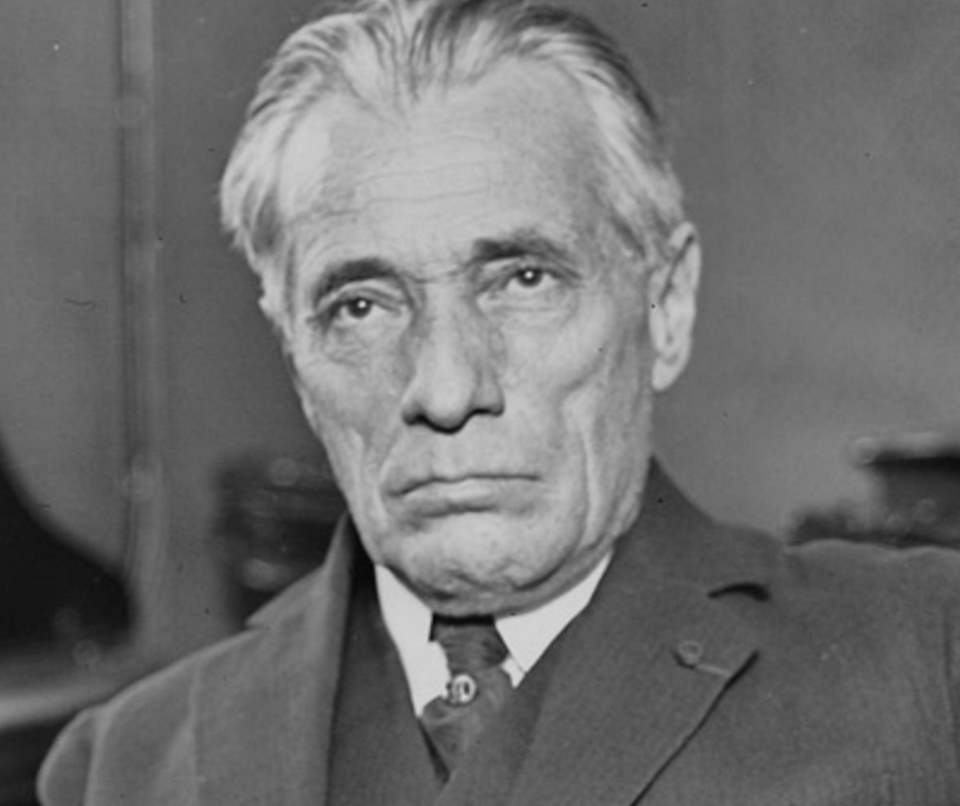
Gear changing systems already existed before 1937. But, Tour de France organizer Henri Desgrange has had strict rules. Once he said that his ideal race would be so hard that only one rider would make it to Paris.
Desgrange was also a traditionalist with equipment. Until 1930 he demanded that riders mend their bicycles without help and that they use the same bicycle from start to end. Exchanging a damaged bicycle for another was allowed only in 1923. Desgrange stood against the use of multiple gears and for many years insisted riders use wooden rims, fearing the heat of braking while coming down mountains would melt the glue that held the tires on metal rims (they were finally allowed in 1937 after Desgrange retired from organizing the Tour de France).
“I still feel that variable gears are only for people over forty-five. Isn’t it better to triumph by the strength of your muscles than by the artifice of a derailleur? We are getting soft. Come on, fellows. Let’s say that the test was a fine demonstration–for our grandparents! As for me, give me a fixed gear!” — Henri Desgrange
Roger Lapébie’s 1937 Tour de France victory was controversial as he was the first rider to complete the race using a modern derailleur. This gave him the advantage of shifting gears without having to stop, dismount, and flip the wheel as was customary of racing bicycles used at the time.
Unlike the Tour, the derailleurs were allowed in the Giro d’Italia. The great Italian rider, five-time Giro winner, and the first UCI World Champion, Alfredo Binda also used the Vittoria gear changer while winning his third UCI World Championship in Rome in 1932. From 1935 and on, Vittoria systems called Vittoria Margherita. They had a rod-controlled pusher on the chainstay that would move the chain while the rider backpedaled.
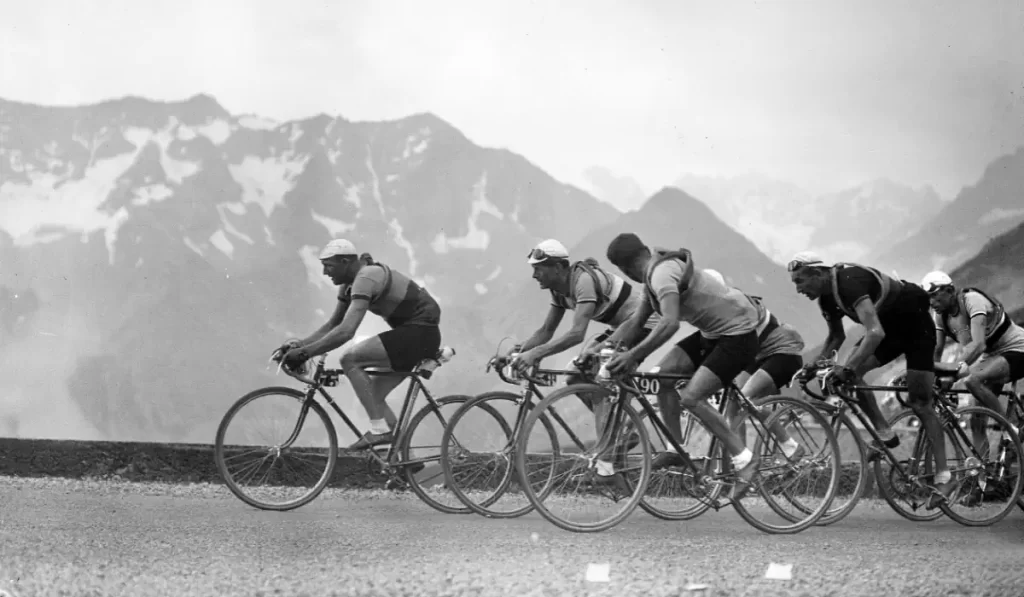
List of Tour de France winner groupsets, Year by Year
1937
- Winner: Roger Lapébie (France)
- Groupset: Super Champion
- Stages: 20, including eight split stages. A split stage was basically two stages in one racing day. The split stages were introduced in the 1934 edition. Individual Time Trial was also introduced in the same year. In the 1934 edition, Stage 21 was split into two parts, and the second part was an individual time trial, the first one in the history of the Tour de France.
- Distance 4,415 km (2,743 mi)
- Winning time: 138h 58′ 31″
- The average speed of the winner: 31.768 km/h or 19.740 mph
- 98 starters, 46 classified finishers (47%)
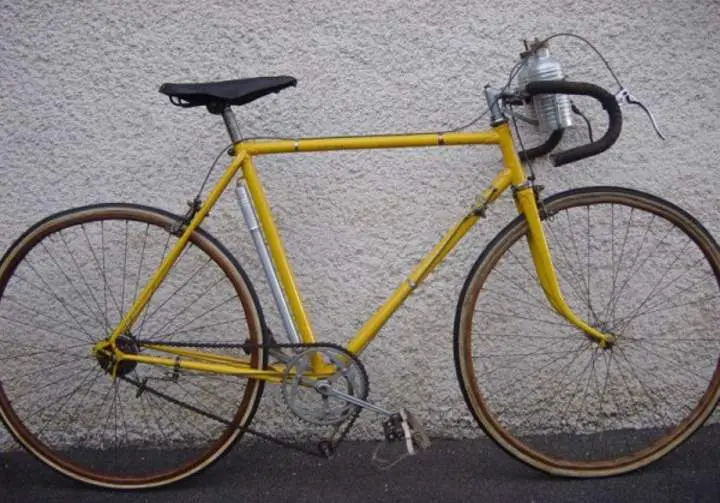
1938
- Winner: Gino Bartali (Italy)
- Groupset: Vittoria Margherita
- Dates: 5-31 July
- Stages: 21, including five split stages
- Distance: 4,694 km (2,917 mi)
- Winning time: 148h 29′ 12″
- The average speed of the winner: 31.565 km/h or 19.614 mph
- 95 starters, 55 classified finishers (58%)
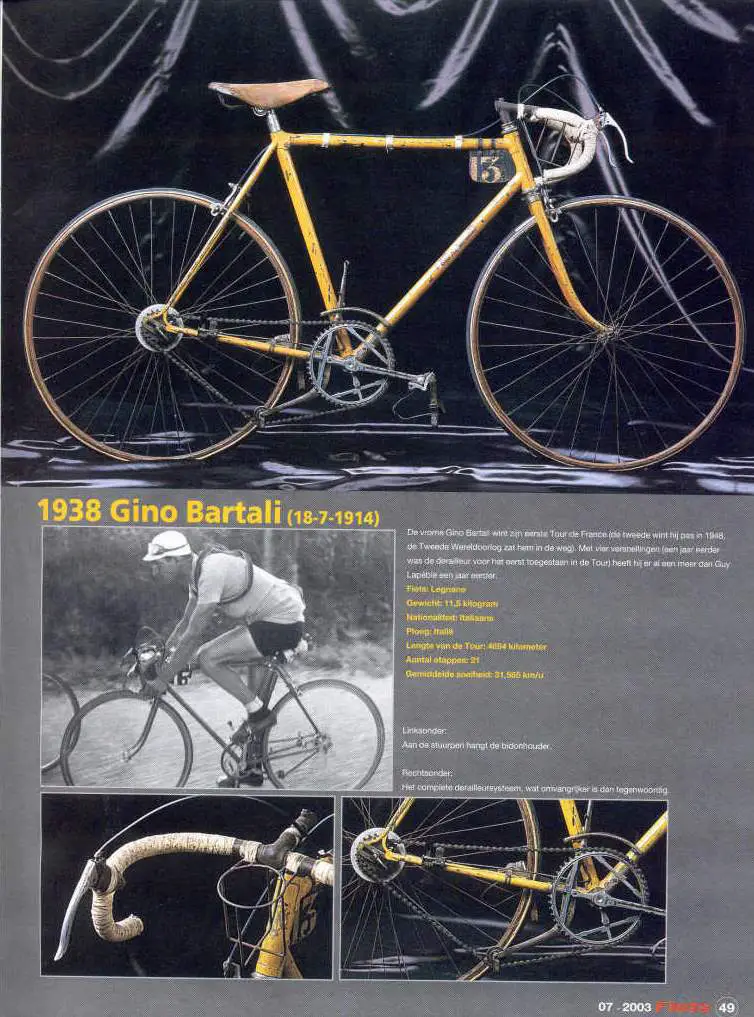
1939
- Winner: Sylvère Maes (2) (Belgium) (His first victory was in 1936)
- Groupset: Super Champion (2)
- Dates: 10-30 July
- Stages: 18, including eight split stages
- Distance: 4,224 km (2,625 mi)
- Winning time: 132h 03′ 17″
- The average speed of the winner: 31.986 km/h or 19.875 mph
- 79 starters, 49 classified finishers (62%)
1940-1945
No race (Second World War)
1946
In 1946 Le Parisien Libéré, together with l’Equipe, organized the Course du Tour de France (English: Tour of France race), also known as Monaco-Paris. There were 5 stages. The race had many things familiar to the old Tours de France: six national teams and five French regional teams were present, and a yellow jersey was also given to the leader of the race. French cyclist Apo Lazarides had won the race. See notes 1.
- Winner: Apo Lazarides (France)
- Groupset: Campagnolo
- Stages: 5
- Distance: 1,316 km (818 mi)
- The average speed of the winner: 29.554 km/h or 18.364 mph
1947
- Winner: Jean Robic (France)
- Groupset: Simplex
- Dates: 25 June – 20 July
- Stages: 21
- Distance: 4,642 km (2,884 mi)
- Winning time: 148h 11′ 25″
- The average speed of the winner: 31.412 km/h or 19.519 mph
- 100 starters, 53 classified finishers (53%)
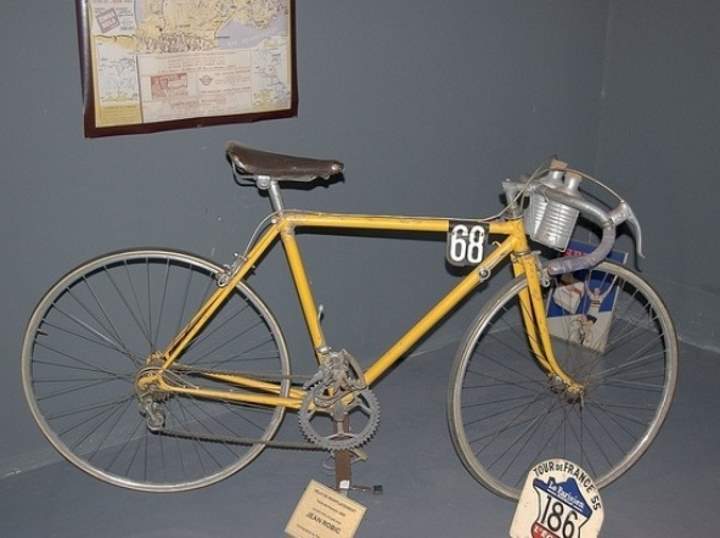
1948
- Winner: Gino Bartali (2) (Italy)
- Groupset: Campagnolo (2)
- Dates: 30 June – 25 July
- Stages: 21
- Distance: 4,922 km (3,058 mi)
- Winning time: 147h 10′ 36″
- The average speed of the winner: 33.443 km/h or 20.781 mph
- 120 starters, 44 classified finishers (37%)
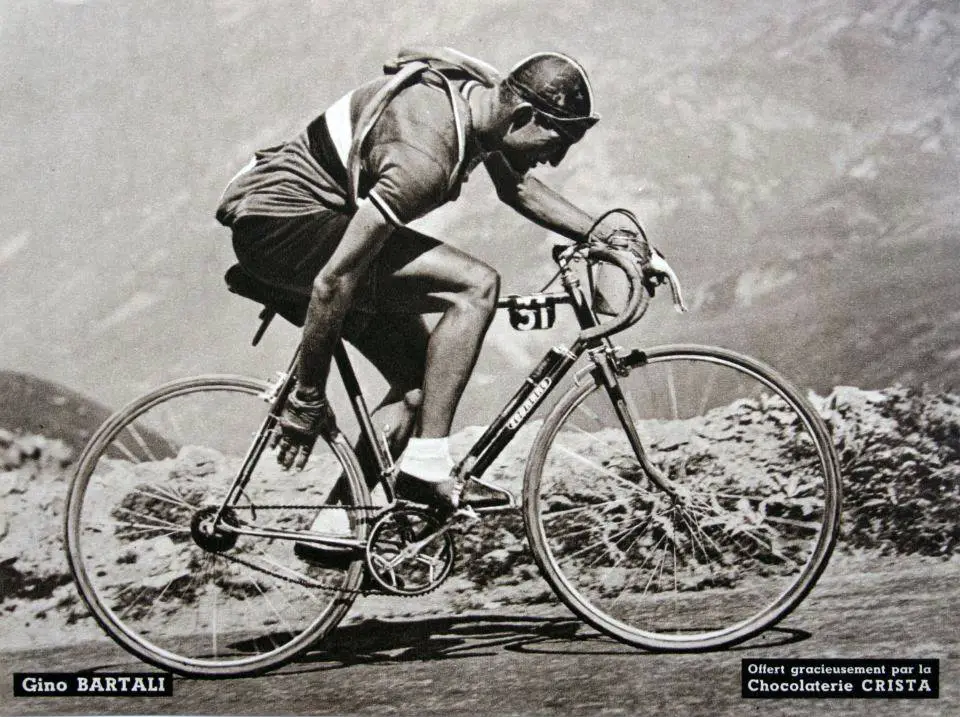
1949
- Winner: Fausto Coppi (Italy)
- Groupset: Simplex (2)
- Dates: 30 June – 24 July
- Stages: 21
- Distance: 4,808 km (2,988 mi)
- Winning time: 149h 40′ 49″
- The average speed of the winner: 32.121 km/h or 19.959 mph
- 120 starters, 55 classified finishers (46%)
1950
- Winner: Ferdinand Kübler (Switzerland)
- Groupset: Simplex (3)
- Dates: 13 July – 7 August
- Stages: 22
- Distance: 4,775 km (2,967 mi)
- Winning time: 145h 36′ 56″
- The average speed of the winner: 32.718 km/h or 20.330 mph
- 116 starters, 51 classified finishers (44%)
1951
- Winner: Hugo Koblet (Switzerland)
- Groupset: Campagnolo (3)
- Dates: 4-29 July
- Stages: 24
- Distance: 4,692 km (2,915 mi)
- Winning time: 142h 20′ 14″
- The average speed of the winner: 32.694 km/h or 20.315 mph
- 123 starters, 66 classified finishers (54%)
1952
- Winner: Fausto Coppi (2) (Italy)
- Groupset: Campagnolo (4)
- Dates: 25 June – 19 July
- Stages: 23
- Distance: 4,827 km (2,999 mi)
- Winning time: 151h 57′ 20″
- The average speed of the winner: 31.739 km/h or 19.722 mph
- 122 starters, 78 classified finishers (64%)
1953
- Winner: Louison Bobet (France)
- Groupset: Huret
- Dates: 3-26 July
- Stages: 22
- Distance: 4,479 km (2,783 mi)
- Winning time: 129h 23′ 25″
- The average speed of the winner: 34.596 km/h or 21.497 mph
- 119 starters, 76 classified finishers (69%)
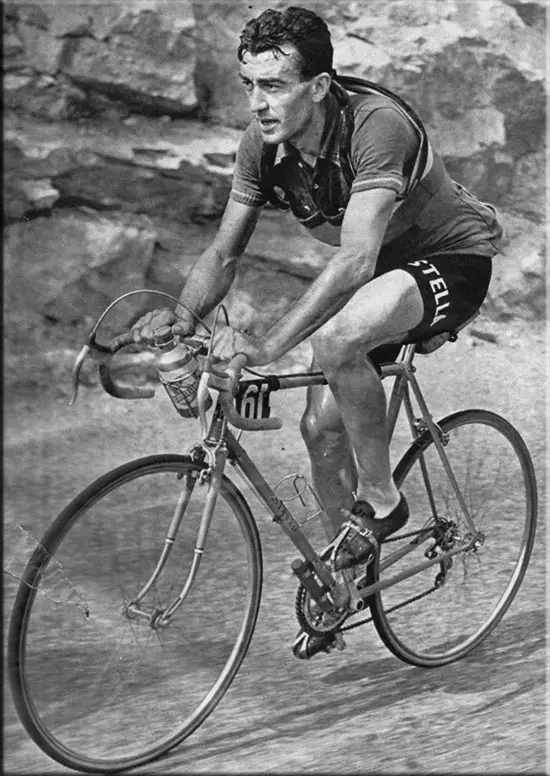
1954
- Winner: Louison Bobet (2) (France)
- Groupset: Huret (2)
- Dates: 8 July – 1 August
- Stages: 23
- Distance: 4,669 km (2,901 mi)
- Winning time: 140h 06′ 05″
- The average speed of the winner: 34.743 km/h or 21.588 mph
- 110 starters, 69 classified finishers (63%)
1955
- Winner: Louison Bobet (3) (France)
- Groupset: Huret (3)
- Dates: 7-30 July
- Stages: 22
- Distance: 4,476 km (2,781 mi)
- Winning time: 130h 29′ 26″
- The average speed of the winner: 34.446 km/h or 21.404 mph
- 130 starters, 69 classified finishers (53%)
1956
- Winner: Roger Walkowiak (France)
- Groupset: Campagnolo (5)
- Dates: 5-28 July
- Stages: 22
- Distance: 4,498 km (2,795 mi)
- Winning time: 124h 01′ 16″
- The average speed of the winner: 36.268 km/h or 22.536 mph
- 120 starters, 88 classified finishers (73%)
1957
- Winner: Jacques Anquetil (France)
- Groupset: Simplex (4)
- Dates: 27 June – 20 July
- Stages: 22
- Distance: 4,665 km (2,899 mi)
- Winning time: 135h 44′ 42″
- The average speed of the winner: 34.25 km/h or 21.28 mph
- 120 starters, 56 classified finishers (47%)
1958
- Winner: Charly Gaul (Luxembourg)
- Groupset: Campagnolo (6)
- Dates: 26 June – 19 July
- Stages: 24
- Distance: 4,319 km (2,684 mi)
- Winning time: 116h 59′ 05″
- The average speed of the winner: 36.92 km/h or 22.94 mph
- 120 starters, 78 classified finishers (65%)
1959
- Winner: Federico Bahamontes (Spain)
- Groupset: Campagnolo (7)
- Dates: 25 June – 18 July
- Stages: 22
- Distance: 4,391 km (2,728 mi)
- Winning time: 123h 46′ 45″
- The average speed of the winner: 35.474 km/h or 22.04 mph
- 120 starters, 65 classified finishers (54%)
1960
- Winner: Gastone Nencini (Italy)
- Groupset: Campagnolo (8)
- Dates: 26 June – 17 July
- Stages: 21, including one split stage
- Distance: 4,173 km (2,593 mi)
- Winning time: 112h 08′ 42″
- The average speed of the winner: 37.210 km/h or 23.121 mph
- 128 starters, 81 classified finishers (63%)
1961
For the last time (except for 1967 and 1968) national and regional teams participated in the Tour de France.
- Winner: Jacques Anquetil (2) (France)
- Groupset: Simplex (5)
- Dates: 25 June – 16 July
- Stages: 21, including one split stage
- Distance: 4,397 km (2,732 mi)
- Winning time: 122h 01′ 33″
- The average speed of the winner: 36.03 km/h or 22.39 mph
- 132 starters, 72 classified finishers (55%)
1962
This is the first edition to run with trade teams since Henri Desgrange began running the Tour with National teams in 1930.
- Winner: Jacques Anquetil (3) (France)
- Groupset: Simplex (6)
- Dates: 24 June – 15 July
- Stages: 22, including two split stages
- Distance: 4,274 km (2,656 mi)
- Winning time: 114h 31′ 54″
- The average speed of the winner: 37.31 km/h or 23.18 mph
- 149 starters, 94 classified finishers (63%)
1963
- Winner: Jacques Anquetil (4) (France)
- Groupset: Campagnolo (9)
- Dates: 23 June – 14 July
- Stages: 21, including two split stages
- Distance: 4,137 km (2,571 mi)
- Winning time: 113h 30′ 05″
- The average speed of the winner: 37.09 km/h or 23.05 mph
- 130 starters, 76 classified finishers (58%)
1964
- Winner: Jacques Anquetil (5) (France)
- Groupset: Campagnolo (10)
- Dates: 22 June – 14 July
- Stages: 22, including three split stages
- Distance: 4,502 km (2,797 mi)
- Winning time: 127h 09′ 44″
- The average speed of the winner: 35.420 km/h or 22.009 mph
- 132 starters, 81 classified finishers (61%)
1965
- Winner: Felice Gimondi (Italy)
- Groupset: Campagnolo (11)
- Dates: 22 June – 14 July
- Stages: 22, including two split stages
- Distance: 4,177 km (2,595 mi)
- Winning time: 116h 42′ 06″
- The average speed of the winner: 35.89 km/h or 22.30 mph
- 130 starters, 96 classified finishers (74%)
1966
- Winner: Lucien Aimar (France)
- Groupset: Campagnolo (12)
- Dates: 21 June – 14 July
- Stages: 22, including three split stages
- Distance: 4,303 km (2,674 mi)
- Winning time: 117h 34′ 21″
- The average speed of the winner: 36.76 km/h or 22.84 mph
- 130 starters, 82 classified finishers (63%)
1967
- Winner: Roger Pingeon (France)
- Groupset: Simplex (7)
- Dates: 29 June – 23 July
- Stages: 22 + Prologue, including two split stages
- Distance: 4,779 km (2,970 mi)
- Winning time: 136h 53′ 50″
- The average speed of the winner: 35.018 km/h or 21.76 mph
- 130 starters, 88 classified finishers (68%)
1968
- Winner: Jan Janssen (Netherlands)
- Groupset: Campagnolo (13)
- Dates: 27 June – 21 July
- Stages: 22, including four split stages
- Distance: 4,685 km (2,911 mi)
- Winning time: 133h 49′ 42″
- The average speed of the winner: 34.894 km/h or 21.682 mph
- 110 starters, 63 classified finishers (57%)
1969
- Winner: Eddy Merckx (Belgium)
- Groupset: Campagnolo (14)
- Dates: 28 June – 20 July
- Stages: 22 + Prologue, including three split stages
- Distance: 4,110 km (2,554 mi)
- Winning time: 116h 16′ 02″
- The average speed of the winner: 35.409 km/h or 22 mph
- 130 starters, 86 classified finishers (66%)
1970
- Winner: Eddy Merckx (2) (Belgium)
- Groupset: Campagnolo (15)
- Dates: 27 June – 19 July
- Stages: 23 + Prologue, including five split stages
- Distance: 4,254 km (2,643 mi)
- Winning time: 119h 31′ 49″
- The average speed of the winner: 35.589 km/h or 22.114 mph
- 150 starters, 100 classified finishers (67%)
1971
- Winner: Eddy Merckx (3) (Belgium)
- Groupset: Campagnolo (16)
- Dates: 26 June – 18 July
- Stages: 20 + Prologue, including three split stages
- Distance: 3,689 km (2,292 mi)
- Winning time: 96h 45′ 14″
- The average speed of the winner: 36.925 km/h or 22.944 mph
- 130 starters, 94 classified finishers (72%)
1972
- Winner: Eddy Merckx (4) (Belgium)
- Groupset: Campagnolo (17)
- Dates: 1-22 July
- Stages: 20 + Prologue, including four split stages
- Distance: 3,846 km (2,390 mi)
- Winning time: 108h 17′ 18″
- The average speed of the winner: 35.371 km/h or 21.979 mph
- 132 starters, 88 classified finishers (67%)
1973
- Winner: Luis Ocaña (Spain)
- Groupset: Campagnolo (18)
- Dates: 30 June – 22 July
- Stages: 20 + Prologue, including six split stages
- Distance: 4,140 km (2,572 mi)
- Winning time: 122h 25′ 34″
- The average speed of the winner: 33.918 km/h or 21.076 mph
- 132 starters, 87 classified finishers (66%)
1974
- Winner: Eddy Merckx (5) (Belgium)
- Groupset: Campagnolo (19)
- Dates: 27 June – 21 July
- Stages: 22 + Prologue, including four split stages
- Distance: 4,098 km (2,546 mi)
- Winning time: 116h 16′ 58″
- The average speed of the winner: 35.241 km/h or 21.898 mph
- 130 starters, 105 classified finishers (81%)
1975
- Winner: Bernard Thévenet (France)
- Groupset: Simplex (8)
- Dates: 26 June – 20 July
- Stages: 22 + Prologue, including two split stages
- Distance: 4,000 km (2,485 mi)
- Winning time: 114h 35′ 31″
- The average speed of the winner: 34.899 km/h or 21.685 mph
- 140 starters, 86 classified finishers (61%)
1976
- Winner: Lucien Van Impe (Belgium)
- Groupset: Campagnolo (20)
- Dates: 24 June – 18 July
- Stages: 22 + Prologue, including three split stages
- Distance: 4,017 km (2,496 mi)
- Winning time: 116h 22′ 23″
- The average speed of the winner: 34.514 km/h or 21.446 mph
- 130 starters, 87 classified finishers (67%)
1977
- Winner: Bernard Thévenet (France) (2)
- Groupset: Simplex (9)
- Dates: 30 June – 24 July
- Stages: 22 + Prologue, including five split stages
- Distance: 4,093 km (2,543 mi)
- Winning time: 115h 38′ 30″
- The average speed of the winner: 35.585 km/h or 22.111 mph
- 100 starters, 53 classified finishers
1978
- Winner: Bernard Hinault (France)
- Groupset: Campagnolo (21)
- Dates: 29 June – 23 July
- Stages: 22 + Prologue, including two split stages
- Distance: 3,908 km (2,428 mi)
- Winning time: 108h 18′ 02″
- The average speed of the winner: 36.084 km/h or 22.422 mph
- 110 starters, 78 classified finishers (71%)
1979
- Winner: Bernard Hinault (2) (France)
- Groupset: Campagnolo (22)
- Dates: 27 June – 22 July
- Stages: 24 + Prologue
- Distance: 3,720 km (2,312 mi)
- Winning time: 103h 06′ 50″
- The average speed of the winner: 36.513 km/h or 22.688 mph
- 150 starters, 89 classified finishers (59%)
1980
- Winner: Joop Zoetemelk (Netherlands)
- Groupset: Campagnolo (23)
- Dates: 26 June – 20 July
- Stages: 22 + Prologue, including two split stages
- Distance: 3,946 km (2,452 mi)
- Winning time: 109h 19′ 14″
- The average speed of the winner: 35.317 km/h or 21.945 mph
- 130 starters, 85 classified finishers (65%)
1981
- Winner: Bernard Hinault (3) (France)
- Groupset: Campagnolo (24)
- Dates: 25 June – 19 July
- Stages: 22 + Prologue, including two split stages
- Distance: 3,756 km (2,334 mi)
- Winning time: 96h 19′ 38″
- The average speed of the winner: 37.99 km/h or 23.61 mph
- 150 starters, 121 classified finishers (81%)
1982
- Winner: Bernard Hinault (4) (France)
- Groupset: Campagnolo (25)
- Dates: 2-25 July
- Stages: 21 + Prologue, including one split stage
- Distance: 3,512 km (2,182 mi)
- Winning time: 92h 08′ 46″
- The average speed of the winner: 37.47 km/h or 23.28 mph
- 170 starters, 125 classified finishers (74%)
1983
- Winner: Laurent Fignon (France)
- Groupset: Simplex (10)
- Dates: 1-24 July
- Stages: 22 + Prologue
- Distance: 3,862 km (2,400 mi)
- Winning time: 105h 07′ 52″
- The average speed of the winner: 35.915 km/h or 22.317 mph
- 140 starters, 88 classified finishers (63%)
1984
- Winner: Laurent Fignon (2) (France)
- Groupset: Campagnolo (26)
- Dates: 29 June – 22 July
- Stages: 23 + Prologue
- Distance: 4,021 km (2,499 mi)
- Winning time: 112h 03′ 40″
- The average speed of the winner: 34.906 km/h or 21.690 mph
- 170 starters, 124 classified finishers (73%)
1985
- Winner: Bernard Hinault (5) (France)
- Groupset: Campagnolo (27)
- Dates: 28 June – 21 July
- Stages: 22 + Prologue, including one split stage
- Distance: 4,128 km (2,565 mi)
- Winning time: 113h 24′ 23″
- The average speed of the winner: 36.215 km/h or 22.502 mph
- 180 starters, 144 classified finishers (80%)
1986
- Winner: Greg LeMond (USA)
- Groupset: Campagnolo (28)
- Dates: 4-27 July
- Stages: 23 + Prologue
- Distance: 4,083 km (2,537 mi)
- Winning time: 110h 35′ 19″
- The average speed of the winner: 37.020 km/h or 23.003 mph
- 210 starters, 132 classified finishers (63%)
1987
- Winner: Stephen Roche (Ireland)
- Groupset: Campagnolo (29)
- Dates: 1-26 July
- Stages: 25 + Prologue
- Distance: 4,231 km (2,629 mi)
- Winning time: 115h 27′ 42″
- The average speed of the winner: 36.645 km/h or 22.770 mph
- 207 starters, 135 classified finishers (65%)
1988
- Winner: Pedro Delgado (Spain)
- Groupset: Campagnolo (30)
- Dates: 2-24 July
- Stages: 22 + Prologue
- Distance: 3,281 km (2,038 mi)
- Winning time: 84h 27′ 53″
- The average speed of the winner: 38.909 km/h or 24.177 mph
- 198 starters, 151 classified finishers (77%)
1989
- Winner: Greg LeMond (2) (USA)
- Groupset: Mavic
- Dates: 1-23 July
- Stages: 21 + Prologue
- Distance: 3,285 km (2,041 mi)
- Winning time: 87h 38′ 35″
- The average speed of the winner: 37.487 km/h or 23.293 mph
- 198 starters, 138 classified finishers (70%)
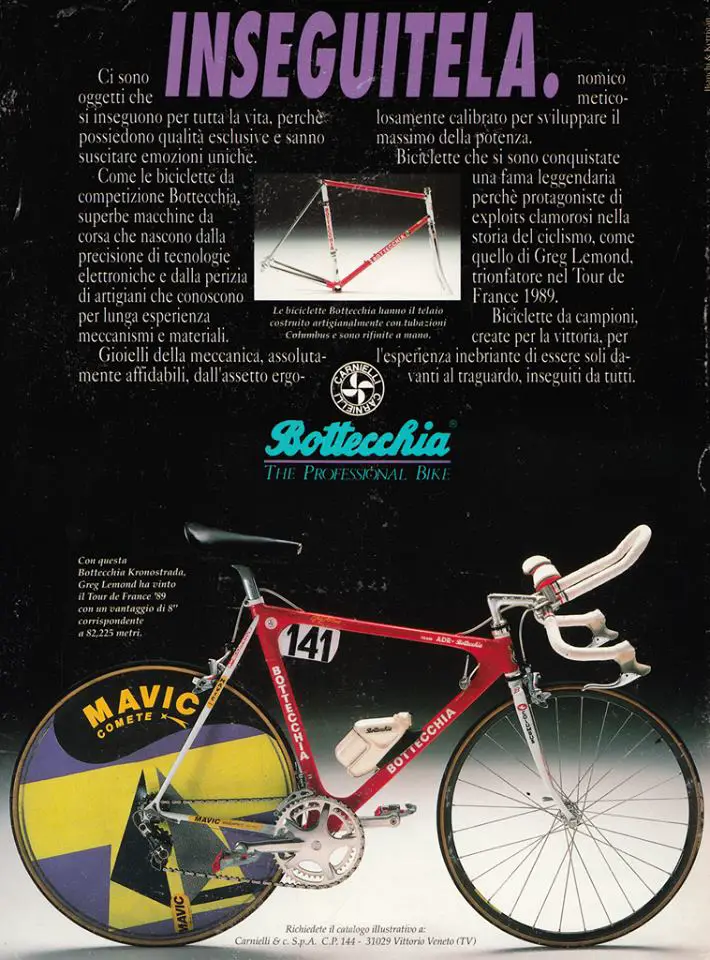
1990
- Winner: Greg LeMond (3) (USA)
- Groupset: Campagnolo (31)
- Dates: 30 June – 22 July
- Stages: 21 + Prologue
- Distance: 3,403.8 km (2,115 mi)
- Winning time: 90h 43′ 20″
- The average speed of the winner: 37.52 km/h or 23.31 mph
- 198 starters, 156 classified finishers (79%)
1991
- Winner: Miguel Indurain (Spain)
- Groupset: Campagnolo (32)
- Dates: 6-28 July
- Stages: 22 + Prologue
- Distance: 3,914 km (2,432 mi)
- Winning time: 101h 01′ 20″
- The average speed of the winner: 38.747 km/h or 24.076 mph
- 198 starters, 158 classified finishers (80%)
1992
- Winner: Miguel Indurain (2) (Spain)
- Groupset: Campagnolo (33)
- Dates: 4-26 July
- Stages: 21 + Prologue
- Distance: 3,983 km (2,475 mi)
- Winning time: 100h 49′ 30″
- The average speed of the winner: 39.504 km/h or 24.547 mph
- 198 starters, 130 classified finishers (66%)
1993
- Winner: Miguel Indurain (3) (Spain)
- Groupset: Campagnolo (34)
- Dates: 3-25 July
- Stages: 20 + Prologue
- Distance: 3,714 km (2,308 mi)
- Winning time: 95h 57′ 09″
- The average speed of the winner: 38.709 km/h or 24.053 mph
- 180 starters, 136 classified finishers (76%)
1994
- Winner: Miguel Indurain (4) (Spain)
- Groupset: Campagnolo (35)
- Dates: 2-24 July
- Stages: 21 + Prologue
- Distance: 3,978 km (2,472 mi)
- Winning time: 103h 38′ 38″
- The average speed of the winner: 38.383 km/h or 23.850 mph
- 189 starters, 117 classified finishers (62%)
1995
- Winner: Miguel Indurain (5) (Spain)
- Groupset: Campagnolo (36)
- Dates: 1-22 July
- Stages: 20 + Prologue
- Distance: 3,635 km (2,259 mi)
- Winning time: 92h 44′ 59″
- The average speed of the winner: 39.193 km/h or 24.353 mph
- 189 starters, 115 classified finishers (61%)
1996
- Winner: Bjarne Riis (Denmark)
- Groupset: Campagnolo (37)
- Dates: 29 June – 21 July
- Stages: 21 + Prologue
- Distance: 3,765 km (2,339 mi)
- Winning time: 95h 57′ 16″
- The average speed of the winner: 39.236 km/h or 24.380 mph
- 198 starters, 129 classified finishers (65%)
1997
- Winner: Jan Ullrich (Germany)
- Groupset: Campagnolo (38)
- Dates: 5-27 July
- Stages: 21 + Prologue
- Distance: 3,944 km (2,451 mi)
- Winning time: 100h 30′ 35″
- The average speed of the winner: 39.238 km/h or 24.381 mph
- 198 starters, 139 classified finishers (70%)
1998
- Winner: Marco Pantani (Italy)
- Groupset: Campagnolo (39)
- Dates: 11 July – 2 August
- Stages: 21 + Prologue
- Distance: 3,875 km (2,408 mi)
- Winning time: 92h 49′ 46″
- The average speed of the winner: 39.983 km/h or 24.844 mph
- 189 starters, 96 classified finishers (51%, the Festina affair)
1999
- No winner (see notes 3)
- Dates: 3-25 July
- Stages: 20 + Prologue
- Distance: 3,687 km (2,291 mi)
- Fastest rider time: 91h 32′ 16″
- The average speed of the fastest rider: 40.276 km/h or 25.026 mph
- 180 starters, 141 classified finishers (78%)
2000
- No winner (see notes 3)
- Dates: 1-23 July
- Stages: 21
- Distance: 3,662 km (2,275 mi)
- Fastest rider time: 92h 33′ 08″
- The average speed of the fastest rider: 39.556 km/h or 24.579 mph
- 177 starters, 127 classified finishers (72%)
2001
- No winner (see notes 3)
- Dates: 7-29 July
- Stages: 20 + Prologue
- Distance: 3,462 km (2,151 mi)
- Fastest rider time: 86h 17′ 28″
- The average speed of the fastest rider: 40.07 km/h or 24.90 mph
- 189 starters, 144 classified finishers (76%)
2002
- No winner (see notes 3)
- Dates: 6-28 July
- Stages: 20 + Prologue
- Distance: 3,278 km (2,037 mi)
- Fastest rider time: 82h 05′ 12″
- The average speed of the fastest rider: 39.88 km/h or 24.78 mph
- 189 starters, 153 classified finishers (81%)
2003
- No winner (see notes 3)
- Dates: 5-27 July
- Stages: 20 + Prologue
- Distance: 3,427 km (2,129 mi)
- Fastest rider time: 83h 41′ 12″
- The average speed of the fastest rider: 40.956 km/h or 25.449 mph
- 198 starters, 147 classified finishers (74%)
2004
- No winner (see notes 3)
- Dates: 3-25 July
- Stages: 20 + Prologue
- Distance: 3,391 km (2,107 mi)
- Fastest rider time: 83h 36′ 02″
- The average speed of the fastest rider: 40.553 km/h or 25.198 mph
- 188 starters, 147 classified finishers (78%)
2005
- No winner (see notes 3)
- Dates: 2-24 July
- Stages: 21
- Distance: 3,607 km (2,241 mi)
- Fastest rider time: 86h 15′ 02″
- The average speed of the fastest rider: 41.654 km/h or 25.883 mph
- 189 starters, 155 classified finishers (82%)
2006
- Winner: Óscar Pereiro (Spain)
- Groupset: Campagnolo (40)
- Dates: 1-23 July
- Stages: 21
- Distance: 3,657 km (2,272 mi)
- Winning time: 89h 40′ 27″
- The average speed of the winner: 40.781 km/h or 25.340 mph
- 176 starters, 139 classified finishers (79%)
2007
- Winner: Alberto Contador (Spain)
- Groupset: Shimano
- Dates: 7-29 July
- Stages: 20 + Prologue
- Distance: 3,570 km (2,218 mi)
- Winning time: 91h 00′ 26″
- The average speed of the winner: 39.226 km/h or 24.374 mph
- 189 starters, 141 classified finishers (75%)
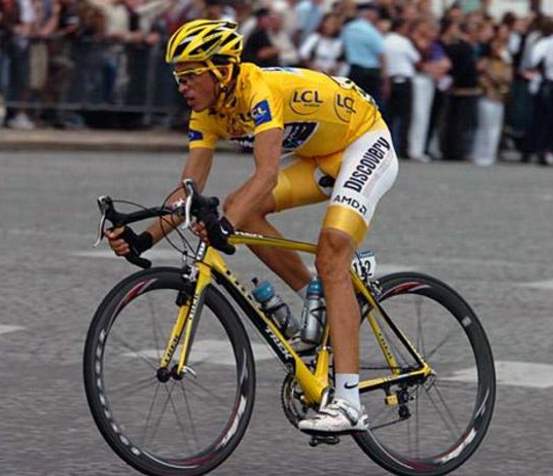
2008
- Winner: Carlos Sastre (Spain)
- Groupset: Shimano (2)
- Dates: 5-27 July
- Stages: 21
- Distance: 3,559 km (2,211 mi)
- Winning time: 87h 52′ 52″
- The average speed of the winner: 40.504 km/h or 25.168 mph
- 180 starters, 145 classified finishers (81%)
2009
- Winner: Alberto Contador (2) (Spain)
- Groupset: SRAM
- Dates: 4-26 July
- Stages: 21
- Distance: 3,459.5 km (2,150 mi)
- Winning time: 85h 48′ 35″
- The average speed of the winner: 40.316 km/h or 25.051 mph
- 180 starters, 156 classified finishers (87%)
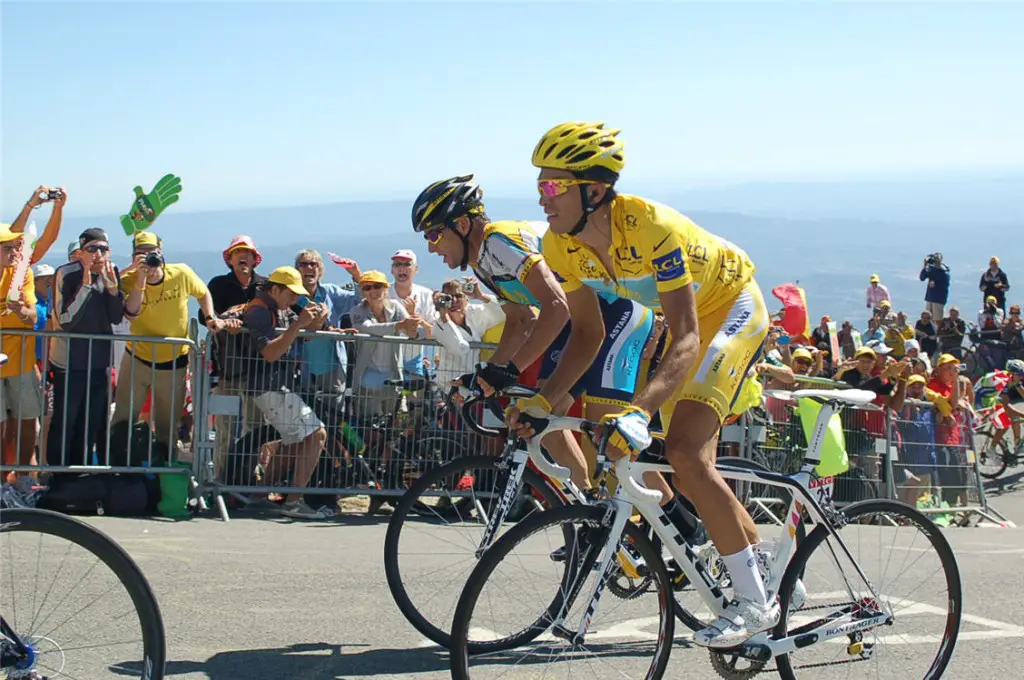
2010
- Winner: Andy Schleck (Luxembourg)
- Groupset: SRAM (2)
- Dates: 3-25 July
- Stages: 20 + Prologue
- Distance: 3,642 km (2,263 mi)
- Winning time: 91h 59′ 27″
- The average speed of the winner: 39.585 km/h or 24.597 mph
- 197 starters, 170 classified finishers (86%)
2011
- Winner: Cadel Evans (Australia)
- Groupset: Shimano (3)
- Dates: 2-24 July
- Stages: 21
- Distance: 3,430 km (2,131 mi)
- Winning time: 86h 12′ 22″
- The average speed of the winner: 39.788 km/h or 24.723 mph
- 198 starters, 167 classified finishers (84%)
2012
- Winner: Bradley Wiggins (Great Britain)
- Groupset: Shimano (4)
- Dates: 30 June – 22 July
- Stages: 20 + Prologue
- Distance: 3,496.9 km (2,173 mi)
- Winning time: 87h 34′ 47″
- The average speed of the winner: 40.4 km/h or 25.1 mph
- 198 starters, 153 classified finishers (77%)
2013
- Winner: Chris Froome (Great Britain)
- Groupset: Shimano (5)
- Dates: 29 June – 21 July
- Stages: 21
- Distance: 3,403.5 km (2,115 mi)
- Winning time: 83h 56′ 40″
- The average speed of the winner: 40.9 km/h or 25.4 mph
- 198 starters, 169 classified finishers (85%)
2014
- Winner: Vincenzo Nibali (Italy)
- Groupset: Campagnolo (41)
- Dates: 5-27 July
- Stages: 21
- Distance: 3,660.5 km (2,275 mi)
- Winning time: 89h 59′ 06″
- The average speed of the winner: 40.7 km/h or 25.3 mph
- 198 starters, 164 classified finishers (83%)
2015
- Winner: Chris Froome (2) (Great Britain)
- Groupset: Shimano (6)
- Dates: 29 June – 21 July
- Stages: 21
- Distance: 3,360.3 km (2,088 mi)
- Winning time: 84h 46′ 14″
- The average speed of the winner: 39.64 km/h or 24.63 mph
- 198 starters, 160 classified finishers (81%)
2016
- Winner: Chris Froome (3) (Great Britain)
- Groupset: Shimano (7)
- Dates: 2-24 July
- Stages: 21
- Distance: 3,529 km (2,193 mi)
- Winning time: 89h 04′ 48″
- The average speed of the winner: 39.6 km/h or 24.6 mph
- 198 starters, 174 classified finishers (88%)
2017
- Winner: Chris Froome (4) (Great Britain)
- Groupset: Shimano (8)
- Dates: 1-23 July
- Stages: 21
- Distance: 3,540 km (2,200 mi)
- Winning time: 86h 20′ 55″
- The average speed of the winner: 41.0 km/h or 25.5 mph
- 198 starters, 167 classified finishers (84%)
For the first time in history, at the 2017 Tour de France, teams using the Shimano Dura-Ace groupset won every stage and jersey. A total of 17 teams were using Shimano, 3 teams were using Campagnolo and only two teams were using SRAM. Teams using groups other than Shimano Dura-Ace have won nothing.
2018
- Winner: Geraint Thomas (Great Britain)
- Groupset: Shimano (9)
- Dates: 7-29 July
- Stages: 21
- Distance: 3,351 km (2,082 mi)
- Winning time: 83h 17′ 13″
- The average speed of the winner: 40.2 km/h or 25.0 mph
- 176 starters, 145 classified finishers (82%)
2019
- Winner: Egan Bernal (Colombia)
- Groupset: Shimano (10)
- Dates: 6-28 July
- Stages: 21
- Distance: 3,365.8 km (2,091 mi)
- Winning time: 82h 57′ 00″
- The average speed of the winner: 40.6 km/h or 25.2 mph
- 176 starters, 155 classified finishers (88%)
2020
- Winner: Tadej Pogačar (Slovenia)
- Groupset: Campagnolo (42)
- Dates: 29 August – 20 September
- Stages: 21
- Distance: 3,484.2 km (2,165 mi)
- Winning time: 87h 20′ 05″
- The average speed of the winner: 39.872 km/h or 24.775 mph
- 176 starters, 146 classified finishers (83%)
2021
- Winner: Tadej Pogačar (2) (Slovenia)
- Groupset: Campagnolo (43)
- Dates: 26 June – 18 July
- Stages: 21
- Distance: 3,414 km (2,121 mi)
- Winning time: 82h 56′ 36”
- The average speed of the winner: 41.161 km/h or 26.576 mph
- 176 starters, 141 classified finishers (80%)
2022
- Winner: Jonas Vingegaard (Denmark)
- Groupset: Shimano (11)
- Dates: 1-24 July
- Stages: 21
- Distance: 3,349.8 km (2,081.5 mi)
- Winning time: 79h 33′ 20”
- The average speed of the winner: 42.03 km/h or 26.116 mph
- 176 starters, 135 classified finishers (77%)
2023
- Winner: Jonas Vingegaard (2) (Denmark)
- Groupset: SRAM (3)
- Dates: 1-23 July
- Stages: 21
- Distance: 3,406 km (2,116 mi)
- Winning time: 82h 05′ 42″
- The average speed of the winner: 41.49 km/h (25.78 mph)
- 176 starters, 150 classified finishers (85%)
General Classification winner Jonas Vingegaard (Jumbo-Visma) used an SRAM 1x (single chainring) setup for the opening stages of the 2023 Tour de France, and again the last ceremonial stage in Paris.
On another side note, Lidl-Trek rider Mads Pedersen would win stage 8 also on 1x, once again using an SRAM Red AXS setup.
2024
- Winner: Tadej Pogačar (3) (Slovenia)
- Groupset: Shimano (12)
- Dates: 29 June – 21 July
- Stages: 21
- Distance: 3,498 km (2,174 miles)
- Winning time: 83h 38′ 56″
- The average speed of the winner: 41.817 km/h (25.983 mph)
- 176 starters, 141 classified finishers (80%)
2025
- Winner: Tadej Pogačar (4) (Slovenia)
- Groupset: Shimano (13)
- Dates: July 5-27
- Stages: 21
- Distance: 3,301.9 km (2,052 miles)
- Winning time: 76h 00′ 32″
- The average speed of the winner: 43.441 km/h (26.987 mph) (the fastest Tour de France edition ever)
- 176 starters, 160 classified finishers (90%, a record percentage of riders finished the race)
Tour de France winner groupsets [Overall]
Campagnolo
- Victories: 43 (see notes 1)
- Country: Italy

Shimano
- Victories: 13 (see notes 3)
- Country: Japan

Simplex
- Victories: 10
- Country: France

SRAM
- Victories: 3
- Country: USA

Huret
- Victories: 3
- Country: France

Super Champion
- Victories: 2
- Country: France

Mavic
- Victories: 1
- Country: France

Vittoria Margherita
- Victories: 1
- Country: Italy

Notes
- If we exclude the 1946 “Monaco-Paris”, Campagnolo has 42 Tour de France victories.
- Camille Daudon was known at the time as the “couturier du cycle” (bicycle designer), but he produced very few bikes. He had just one worker in a small shop near the Champs Elysées, Paris, and only made bikes for a short period post-war to c.1952. Considered a huge craftsman in the construction of cycles, Camille Daudon bikes are rare.
- Lance Armstrong has been stripped of his seven Tour de France victories. He was using the Shimano Dura-Ace groupset.
Sources
- Tour de France on Wikipedia
- McGann, B. and McGann, C: The Story of the Giro d’Italia: A Year-by-Year History of the Tour of Italy, Volume 1: 1909-1970. McGann Publishing, United States
- Henri Desgrange on Wikipedia
- Tour de France during World War II on Wikipedia
- UCI Elite Men Road Race World Champions: The Complete List [1927-2025] - September 28, 2025
- What Is Zone 2 In Cycling? - September 12, 2025
- The Turkish Flag at the Tour de France: Who’s Waving It at the Finish Line? - July 30, 2025

9 replies on “Tour de France Winner Groupsets [Year by Year, from 1937 to 2025]”
Interesting read, thank you for compiling it.
You’re welcome, thanks for reading!
Wow good read… just noticed that in early period you include the frames that carry the groupsets. Maybe another post on the frame makers and its brand?
Hi Egai, thank you for the comment. I am glad you liked it! About framesets, I am thinking about it too, but it’s very hard to find who built what. For example, most Peugeot frames were built by Masi or Indurain’s Pinarello frames were built by Pegoretti, and it was a pretty common practice back then. I am still in the search phase.
Excellent read! Thanks for compiling it in a useful way.
You’re welcome! I’m glad you liked the article.
Nice job mate. Why do you think that Campagnolo has not been able to be competitive in the last 20 years?
I think because most pro teams use Shimano in the last 20 years. So it’s normal that Shimano-equipped bicycles are winning more races.
Fascinating article, thanks for all the research and for writing it. I have just ordered a bike equipped with an electronic groupset, 105 rather than Dura Ace.